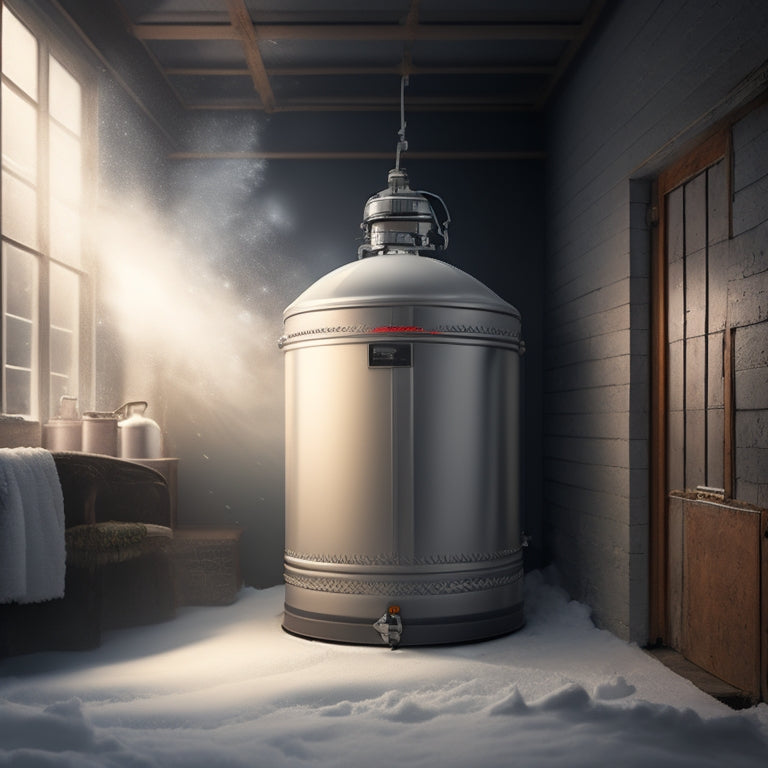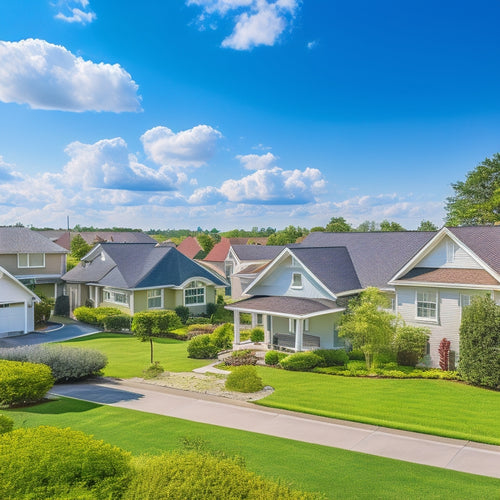
What Affects Water Heater Efficiency During Cold Months?
Share
You can expect your water heater's efficiency to take a hit during cold months due to factors such as reduced solar radiation, heat loss, and snow and debris accumulation. Weaker sun energy and shorter days affect solar water heating systems, while poor insulation and debris blockages further compromise performance. Additionally, the seasonal angle of the sun's rays reduces energy output, and a 1°F drop in temperature can increase energy consumption by 1.5%. To optimize your water heater's performance, it's essential to understand these factors and how they impact your system - now's the time to investigate the specific adjustments you can make to stay ahead of the cold.
Key Takeaways
- Weaker sun energy and shorter days during winter reduce solar water heating system performance, emphasizing the need for regular maintenance.
- Insulation material selection is crucial for minimizing heat loss in cold climates, with options like vacuum insulation panels offering high performance.
- System angle optimization between 30° to 50° ensures maximum sunlight capture during winter, reducing reliance on backup heating sources.
- Snow and debris accumulation can compromise insulation, increase heat loss, and hinder water heater efficiency, making regular roof maintenance essential.
- A 1°F drop in water temperature can increase energy consumption by 1.5%, highlighting the importance of consistent water temperature for optimal efficiency.
Winter's Impact on Solar Water Heating
During the winter months, solar water heating systems often struggle to keep up with your hot water demands. This is because the sun's energy is weaker, and the days are shorter, resulting in reduced solar panel performance.
To mitigate this, regular solar panel maintenance is essential to guarantee peak winter performance. Additionally, exploring renewable energy solutions can help minimize operating costs and reduce reliance on traditional energy sources.
Moreover, considering the benefits of solar energy, such as creating zero-emission solutions and future-proofing your business, can make a significant difference in your system's efficiency. This includes cleaning the panels to remove debris, checking for any damage, and confirming proper insulation to minimize heat loss.
Cold Climate Solar Water Heater Design
When designing a solar water heater for cold climates, you'll need to prioritize insulation material selection to minimize heat loss and maximize efficiency.
Incorporating eco-friendly designs, such as green roofs, can further enhance the system's overall sustainability.
You'll also need to optimize the system angle to guarantee the collector receives the most sunlight possible, given the lower winter sun angle.
Insulation Material Selection
Selecting the right insulation material is vital for a cold climate solar water heater design, as it directly impacts the system's overall efficiency and ability to provide hot water during freezing temperatures.
You'll want to choose an insulation material with high thermal resistance to minimize heat loss. Customizable systems, such as those found in truck-mounted renewable energy solutions, can also be beneficial in optimizing energy output.
Additionally, durable materials that can withstand harsh environmental conditions are essential in guaranteeing the longevity of the system. Common insulation types for solar water heaters include fiberglass, foam, and vacuum insulation panels.
When selecting an insulation material, consider factors such as thermal conductivity, density, and moisture resistance. For example, vacuum insulation panels offer high thermal resistance and are ideal for cold climates.
System Angle Optimization
Optimizing the system angle of your cold climate solar water heater design is vital to maximize its energy output, especially in regions with low solar irradiance.
You'll want to angle your system between 30° to 50° to capture the most sunlight during winter months. This optimization guarantees your system operates at peak performance, reducing the need for backup heating sources.
When considering solar panel installation for EV fleet charging, it's essential to evaluate available space for installation, guaranteeing compliance with local regulations.
Regular system maintenance, such as cleaning the collector surface, is important to maintain efficiency. You should also monitor your system's efficiency regularly to identify potential issues.
Insulation and Heat Loss Prevention
About 25% of the heat produced by your water heater can escape through the walls of the tank, especially in cold months. This heat loss can greatly reduce your water heater's efficiency. To prevent this, you can use insulation to retain heat. There are various insulation types, each with its own benefits and drawbacks.
| Insulation Type | Heat Retention | Cost |
|---|---|---|
| Fiberglass | Medium | Low |
| Foam | High | Medium |
| Reflective | Low | High |
| Vacuum | Very High | Very High |
| Spray Foam | High | High |
Choose an insulation type that suits your needs and budget. Proper insulation can help reduce heat loss and increase your water heater's efficiency.
Temperature and Energy Output Correlation
By retaining heat with insulation, you can guarantee your water heater operates at its best. This is because the water temperature directly correlates with energy consumption.
When the water temperature drops, your water heater consumes more energy to heat it back up to the desired temperature. In cold months, it's crucial to maintain a consistent water temperature to minimize energy consumption. A 1°F drop in water temperature can increase energy consumption by 1.5%.
Conversely, a well-insulated water heater can maintain a consistent temperature, reducing energy consumption and saving you money on your utility bills.
Additionally, optimizing energy-efficient equipment, such as selecting energy-efficient models, can also help reduce energy losses.
Seasonal Angle of the Sun's Rays
As winter approaches, the sun's rays strike the Earth at a more oblique angle, resulting in reduced solar radiation and lower ambient temperatures.
This change in the sun's angle affects your water heater's efficiency. With shorter sunlight duration, your water heater receives less solar energy, reducing its ability to heat water efficiently.
Additionally, the lower solar intensity means your water heater needs to work harder to maintain the desired temperature, consuming more energy.
This increased energy consumption can lead to higher utility bills and a larger carbon footprint.
Understanding the impact of the seasonal angle of the sun's rays on your water heater's efficiency can help you take corrective measures to optimize its performance during the cold months.
Snow and Debris Accumulation Effects
You'll want to inspect your roof's snow load capacity to guarantee it can handle the weight of accumulated snow, as excessive snow can compromise the structural integrity of your roof and affect your water heater's performance.
Additionally, you should clear debris from your roof and surrounding areas to prevent blockages that can restrict airflow and reduce your water heater's efficiency.
Roof Snow Load
Heavy snowfall and debris accumulation on your roof can considerably impact your water heater's efficiency during cold months.
The added weight of snow and debris can cause your roof to sag, which can lead to inadequate insulation and heat loss. This means your water heater has to work harder to maintain the desired temperature, resulting in decreased heating efficiency.
Regular roof maintenance is essential to prevent this issue. Clearing snow and debris from your roof can help maintain its structural integrity and reduce heat loss.
Debris Blockage Issues
During the cold months, snow and debris accumulation around your water heater can create debris blockage issues, hindering its efficiency. This can lead to reduced hot water supply, increased energy bills, and even premature wear on your heater.
To prevent debris blockage issues, make sure to:
- Regularly inspect the area around your water heater for snow and debris accumulation
- Perform debris removal tasks, such as shoveling or sweeping, to clear the area
- Follow maintenance tips, like ensuring proper ventilation and checking for blockages in the heater's combustion chamber, to keep your water heater running efficiently
Frequently Asked Questions
Can I Use a Water Heater With a Lower Wattage During Winter?
"Absence of evidence doesn't mean evidence of absence." You can use a lower-wattage water heater during winter, but be aware that it may impact winter performance; a lower wattage may lead to longer heating times, affecting your freedom to access hot water when needed.
Are Energy-Efficient Water Heaters More Expensive to Purchase?
You'll find that energy-efficient water heaters typically come with higher initial costs, but they'll save you money in the long run with reduced energy consumption, resulting in significant long-term savings that'll give you financial freedom.
Can I Install a Water Heater in an Unheated Garage or Basement?
"Measure twice, cut once" when deciding to install a water heater in an unheated garage or basement; you'll want to guarantee proper installation tips, like insulating the garage to maintain a consistent temperature, to avoid efficiency drops and make sure your investment pays off.
Do I Need to Drain My Water Heater Before Winter to Prevent Damage?
You don't need to drain your water heater before winter, but you should take winter maintenance steps to prevent frozen pipes, like insulating exposed pipes and keeping the garage or basement above freezing to guarantee trouble-free operation.
Will a Water Heater Work Efficiently With a Malfunctioning Thermostat?
As you maneuver through the thermostat's sweet spot, a malfunctioning one can leave your water heater stuck in neutral, like a car with a faulty GPS, preventing ideal heating efficiency; proper thermostat calibration is key to releasing your heater's full potential.
Related Posts
-

What Cool Roof Tax Breaks Can Homeowners Claim?
You can claim federal tax credits of up to $500 and state and local incentives for installing cool roofs, which not o...
-

What Are Natural Clay Paints for Green Home Interiors?
You're about to uncover a game-changing alternative to synthetic paints that not only enhances the aesthetic of your ...
-

7 Blockchain Tools for Home Energy Management
You can utilize blockchain technology to optimize your home's energy management through innovative solutions like blo...


